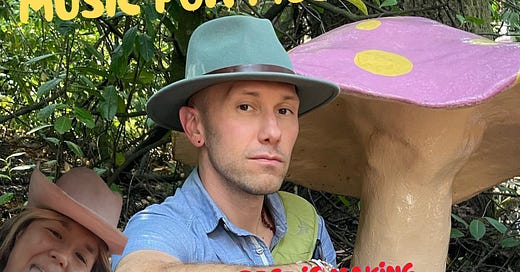“I really want this music to be taken seriously,” says East Forest (real name: Trevor Oswalt), a beloved figure in the psychedelic scene who has devoted his career to composing soundtracks for shrooms. “How can we use music as a tool?” We’re sitting in the backstage greenroom of a buzzing warehouse in Austin a few hours before his show—which you might remember from the opening scene of my Guardian article!—and will also feature electronic producer Jon Hopkins psychedelic podcaster Aubrey Marcus. Buzzing around the warehouse are music agents, technicians hauling expensive sound-systems, and staffers arranging yoga mats and tea lights around a circular stage.
“We all know concerts are modern ceremonies, and we’re not really acknowledging it,” Oswalt continues, explaining how his shows—which he calls “ceremonial concerts”—are part of his vocation to bring ritual back to the recreational realm of live music. He does this through incorporating techniques more typical to a wellness event than a concert, leading the audience through guided meditations, call-and-response chants, intention setting, and breathwork, while staffers walk around spraying scents and tinkling bells.
(I know this sounds like… a lot… but I’m always down for new models for nightlife oriented around healing—and I loved that an alcohol-peddling bar was conspicuously missing from this room. I will deliver the tea about what this ceremonial-concert was really like in a later post!)
Oswalt began making music as East Forest in New York City in 2009 as a response to the upheaval of the financial crisis and Occupy movement, and began composing songs to guide psilocybin journeys—often refining his sonic techniques through playing live, improvised sets at underground ceremonies. He released his seminal record Music for Mushrooms in 2019; his follow-up, IN: A Soundtrack For The Psychedelic Practitioner, premiered last month on Trip, the ketamine clinic Field Trip’s app. He also has the distinction of having collaborated on an album with the late spiritual leader Ram Dass.
Oswalt’s soundscapes weave together classical piano and other gentle instrumentation with nature field recordings, soothing melodies, and his own throaty singing—it’s kind of like Sigur Ros for shroomheads, or elf songs for people who call psychedelics “plant medicine” and only do drugs “in ceremony,” if you know what I mean.
I have to admit that I initially perceived Oswalt as the type of New Age-adjacent musician I might have a hard time connecting with beyond our techno-utopian views on tripping. And tbh, I still have some reservations about appropriation and privilege in the world he seems to revolve in. But from the moment Oswalt sat down next to me, he was sweet, humble (a rarity in the male-ego-driven psychedelic industry tbh!)—and brimming with thoughtful insights on the psychedelic underground.
So while the world is slowly waking up to the critical role that music plays in psychedelic therapy, Oswalt is an O.G. who has spent years refining his techniques in shroom ceremonies, and our conversation below enriched many of the ideas feeding my ongoing research into psychedelics and rave culture, such as:
nightlife + music as a healing praxis
legal liabilities + economic issues + safety concerns around holding psychedelic events
how digital tools are transforming psychedelic music
why music for psychedelics should be modal and liminal
Ceremonial concerts vs. old-school acid parties like David Mancuso’s Loft
Keep reading with a 7-day free trial
Subscribe to Rave New World to keep reading this post and get 7 days of free access to the full post archives.



